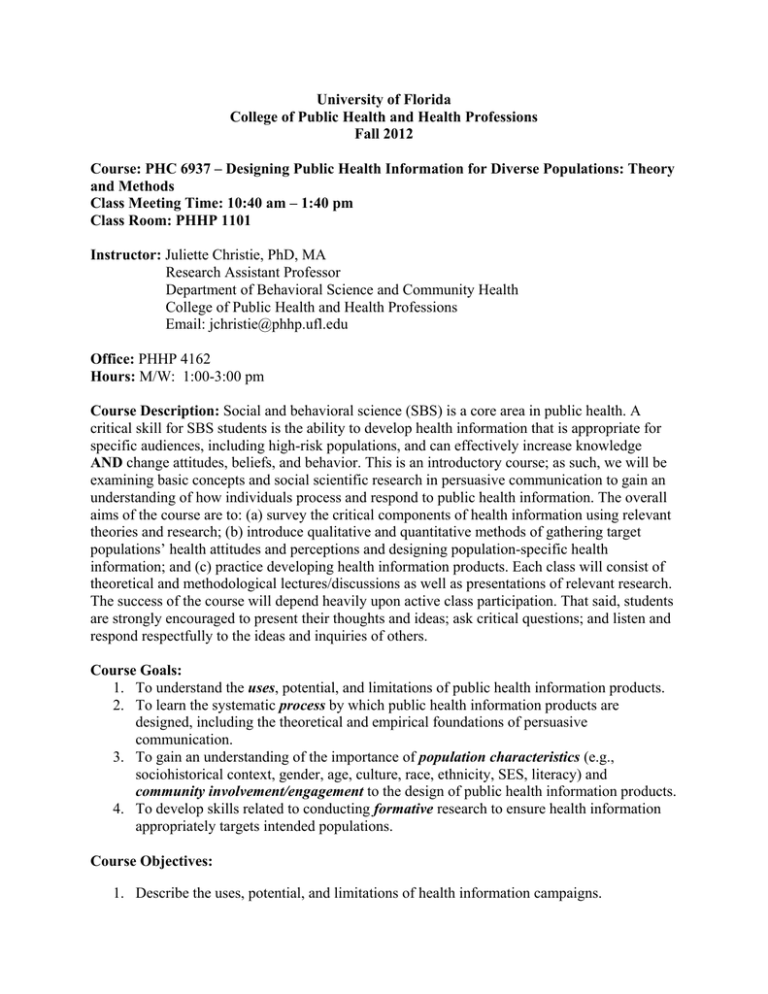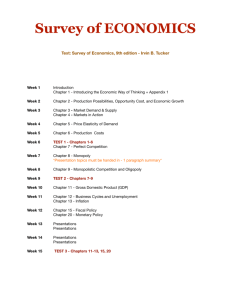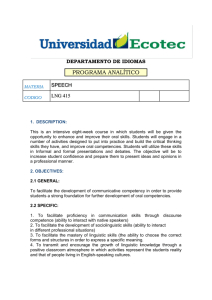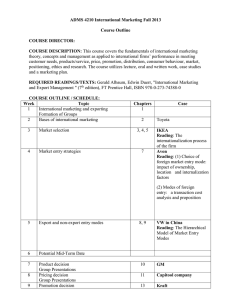University of Florida College of Public Health and Health Professions Fall 2012
advertisement

University of Florida College of Public Health and Health Professions Fall 2012 Course: PHC 6937 – Designing Public Health Information for Diverse Populations: Theory and Methods Class Meeting Time: 10:40 am – 1:40 pm Class Room: PHHP 1101 Instructor: Juliette Christie, PhD, MA Research Assistant Professor Department of Behavioral Science and Community Health College of Public Health and Health Professions Email: jchristie@phhp.ufl.edu Office: PHHP 4162 Hours: M/W: 1:00-3:00 pm Course Description: Social and behavioral science (SBS) is a core area in public health. A critical skill for SBS students is the ability to develop health information that is appropriate for specific audiences, including high-risk populations, and can effectively increase knowledge AND change attitudes, beliefs, and behavior. This is an introductory course; as such, we will be examining basic concepts and social scientific research in persuasive communication to gain an understanding of how individuals process and respond to public health information. The overall aims of the course are to: (a) survey the critical components of health information using relevant theories and research; (b) introduce qualitative and quantitative methods of gathering target populations’ health attitudes and perceptions and designing population-specific health information; and (c) practice developing health information products. Each class will consist of theoretical and methodological lectures/discussions as well as presentations of relevant research. The success of the course will depend heavily upon active class participation. That said, students are strongly encouraged to present their thoughts and ideas; ask critical questions; and listen and respond respectfully to the ideas and inquiries of others. Course Goals: 1. To understand the uses, potential, and limitations of public health information products. 2. To learn the systematic process by which public health information products are designed, including the theoretical and empirical foundations of persuasive communication. 3. To gain an understanding of the importance of population characteristics (e.g., sociohistorical context, gender, age, culture, race, ethnicity, SES, literacy) and community involvement/engagement to the design of public health information products. 4. To develop skills related to conducting formative research to ensure health information appropriately targets intended populations. Course Objectives: 1. Describe the uses, potential, and limitations of health information campaigns. 2. Use a process approach to design a public health information campaign. 3. Apply persuasive communication theories to the design of the public health information campaigns. 4. Explain the importance of power differentials, gender, culture, and other population characteristics to the design of public health information campaigns. 5. Explain the role of community-based participatory research (CBPR) to the design of public health information campaigns. 6. Demonstrate the skills related to developing targeted materials for designing a public health information campaign. 7. Use program evaluation methods in the design of public health information campaigns. Course Assignments: The course will consist of the following: 1. 2. 3. 4. 5. 5 Reviewer Critique(s)/Reaction Paper(s) to Assigned Articles Lead Author Presentation Group Project Group Project Presentation Class Participation 25 points 25 points 20 points 20 points 10 points 100 possible points Grading Scale: A = 90.0-100%; B+ = 85.0-89.9%; B = 80.0-84.9% C+ = 75.0-79.9% C = 70.0-74.9% D+ = 65.0-69.9% D = 60.0-64.9% F = < 60% Academic Integrity: Each student is bound by the academic honesty guidelines of the University that state: “The students of the University of Florida recognize that academic honesty and integrity are fundamental values of the university community. Students who enroll at the university commit to holding themselves and their peers to the high standard of honor required by the honor code. Any individual who becomes aware of a violation of the honor code is bound by honor to take corrective action. The quality of a University of Florida education is dependent upon community acceptance and enforcement of the honor code.” Upon submission of an assignment, each student implies the pledge: “On my honor, I have neither given nor received unauthorized aid in doing this assignment.” Students with Disabilities: Students with disabilities will be accommodated. Students must follow the written University procedure: “Students requesting classroom accommodation must first register with the Dean of Students Office. The Dean of Students Office will provide documentation to the student who must then provide this documentation to the Instructor when requesting accommodation.” Readings: Texts Perloff, P. M. (2008). The dynamics of persuasion. Communication and attitudes in the 21st century (3rd ed.). New York: Lawrence Erlbaum Associates. Making health communications program work (The Pink Book) Articles TBA Course Schedule* Date 9/11 Topic(s) Introduction to Course Persuasive Communication and Focus on Diverse Populations Overview of Public Health Information Campaigns Readings Perloff: Chapters 1 & 12 9/18 Attitude-Behavior Relationship and Persuasion Theoretical Models, Foundations and Methods Perloff Chapters: 2-4 9/25 Understanding Communication Components o Message Effects o Source Effects 10/2 Guest Lecture: Tobacco Cessation/Prevention: Dr. Barnett Project Discussion Perloff chapters: 6, (7) 247-258,280291, & 8; 2 articles Review prior readings 10/9 Guest Lecture: Tobacco Cessation/Prevention: Dr. Pomeranz Set Tentative Focus Group Dates Review: Persuasive Communication Theory/Methods and Moderators of AttitudeBehavior Relationship Group Presentations/Discussions of Message and Source Effects Review prior readings 10/16 Receiver Effects Perloff chapters 5,8, & 9; 2 articles 2 Lead Author Presentations Fear Appeals: (7)263-280; 2 articles: CBPR 10/23 Infusing Qualitative Research for Diverse Populations: Part I o Formative Research and CBPR 2 Lead Author Presentations Making health communications programs work: Stages 1 &2; articles 10/30 Infusing Qualitative Research for Diverse Populations: Part II o Process and Outcome Evaluation 2 Lead Author Presentations Making health communications programs work: Stages 3 & 4; articles 11/6 Health and Media: Advertising and Social Campaigns/Advocacy o Social Marketing/Technology 3 Lead Author Presentations Perloff Chapter 11; articles 11/13 Interpersonal Persuasion: Theories/Models and Methods o Patient-Provider Communication o Compliance-Gaining Strategies and Applications 3 Lead Author Presentations Perloff chapters: 10; articles 11/20 Interpersonal Persuasion Continued Sigma and Disability in Health Communication 3 Lead Author Presentations articles 11/27 Public Policy and Ethics 3 Lead Author Presentations articles 12/4 Class Project Presentations *subject to change



